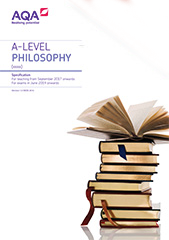Scheme of assessment
Find past papers and mark schemes, and specimen papers for new courses, on our website at aqa.org.uk/pastpapers
This specification is designed to be taken over two years.
This is a linear qualification. In order to achieve the award, students must complete all assessments at the end of the course and in the same series.
A-level exams and certification for this specification are available for the first time in May/June 2019 and then every May/June for the life of the specification.
All materials are available in English only.
Our A-level exams in Philosophy include questions that allow students to demonstrate their ability to:
- draw together their understanding of philosophical concepts, theories and methods, introduced in Epistemology and then developed across the full course of study
- show their understanding of the nature of knowledge claims across the topics and the kinds of arguments which support those claims
Aims
Courses based on this specification should encourage students to:
- understand the ways in which philosophers have analysed the core concepts of philosophy, and be able to identify how subtle differences in analyses can have wider impacts on philosophical arguments
- understand the main philosophical arguments within topics, through the works of philosophers, and articulate those arguments in appropriate forms, correctly, clearly and precisely
- understand the philosophical claims which are made within each topic and be able to articulate those claims correctly, clearly and precisely. Students must also articulate how those claims might relate to other topic areas
- understand the ways in which philosophical arguments are developed, issues are raised, and arguments are reformulated in response to those issues
- understand the similarities and differences between the forms of reasoning used in different philosophical content areas, including the similarities and differences between different kinds of knowledge
- generate responses using appropriate philosophical formats, to a range of philosophical questions. These responses must include: articulating definitions; articulating arguments and counter-arguments; and selecting, applying and evaluating appropriate material to generate their own arguments.
Assessment objectives
Assessment objectives (AOs) are set by Ofqual and are the same across all A-level Philosophy specifications and all exam boards.
The exams will measure how students have achieved the following assessment objectives.
- AO1: Demonstrate knowledge and understanding of the core concepts and methods of philosophy, including through the use of philosophical analysis.
- AO2: Analyse and evaluate philosophical arguments to form reasoned judgements.
Assessment objective weightings for A-level Philosophy
| Assessment objectives (AOs) | Component weightings (approx %) | Overall weighting (approx %) | |
|---|---|---|---|
| Paper 1 | Paper 2 | ||
| AO1 | 30 | 30 | 60 |
| AO2 | 20 | 20 | 40 |
| Overall weighting of components | 50 | 50 | 100 |
Assessment weightings
The marks awarded on the papers will be scaled to meet the weighting of the components. Students’ final marks will be calculated by adding together the scaled marks for each component. Grade boundaries will be set using this total scaled mark. The scaling and total scaled marks are shown in the table below.
| Component | Maximum raw mark | Scaling factor | Maximum scaled mark |
|---|---|---|---|
| Epistemology and moral philosophy | 100 | x1 | 100 |
| The metaphysics of God and the metaphysics of mind | 100 | x1 | 100 |
| Total scaled mark: | 200 | ||
Aims
Courses based on this specification must ensure that students:
- consider and develop an understanding of the ways in which philosophers have engaged with traditional philosophical issues and philosophical approaches to problems, through the detailed study of the arguments of philosophers in identified texts.
- develop an understanding of the core concepts of philosophy and begin to develop their own skill of conceptual analysis, through the study of the ways in which philosophers have analysed concepts and have, through conceptual analysis, identified subtle differences which have a wider impact on philosophical arguments.
- develop their ability to identify argument forms, and analyse and evaluate arguments appropriately, through the study of the ways in which philosophers have analysed and evaluated the soundness of arguments by considering the validity of the argument and/or the truth of the premises.
- develop and refine their ability to identify and distinguish argument within a source/text, ask thoughtful, relevant and penetrating questions; analyse and evaluate arguments of others, and present and defend their own arguments clearly, logically and cogently.
- develop and refine their writing skills, demonstrating the ability to be precise, concise and accurate, correctly using the technical vocabulary of philosophy.
